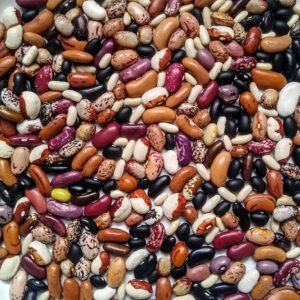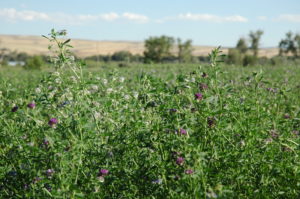
 As we wrote last month, USDA has completed its environmental impact statement for GE alfalfa and is poised to approve (“deregulate”) its use. Secretary Vilsack has rejected the option to prohibit the planting GE alfalfa, despite the agency’s acknowledgment in its environmental impact study that GE contamination of organic and conventionally grown crops presents a huge problem. Alfalfa is a primary feed for organic dairy and livestock production.
As we wrote last month, USDA has completed its environmental impact statement for GE alfalfa and is poised to approve (“deregulate”) its use. Secretary Vilsack has rejected the option to prohibit the planting GE alfalfa, despite the agency’s acknowledgment in its environmental impact study that GE contamination of organic and conventionally grown crops presents a huge problem. Alfalfa is a primary feed for organic dairy and livestock production.
WHAT YOU CAN DO
Send your own comments to USDA and President Obama today and urge your colleagues, friends, local businesses and organizations to do the same.
Suggested language (please add your own):
“I am ___________, a farmer/citizen in (your state). Please do not allow the commercial release of GE alfalfa. Before any release can happen, there must be independent scientific evaluation of public health, environmental, and economic consequences of that release, ongoing government oversight and protection, and a plan for compensation of those harmed by accidental contamination.”
Sincerely,
Your Name Organization, Concerned Citizen, etc.
Who to contact:
USDA/APHIS
Email: biotechquery@aphis.usda.gov
Call: 301-851-2300
President Barack Obama
Comment line: (202) 456-1111
Fax: (202) 456-2461
Email: http://www.whitehouse.gov/contact/
Prior to any deregulation of new genetically engineered crops, a GE contamination plan is essential to protecting all non-GE crops. At a minimum, the following seven points must be addressed transparently and fairly for all stakeholders involved. See the National Organic Coalition’s Contamination Prevention Plan for details. The seven points include:
1. Establish a USDA Public Breeds Institute to ensure that the public has access to high quality non-GMO breeds and germplasm.
2. Create a Contamination Compensation Fund (see NOC’s draft proposal)that is funded by GMO patent holders to provide immediate assistance to persons contaminated by GMOs, from seed to table.
3. Complete elimination of deregulated GE crop status, including prior deregulations, with ongoing oversight and public evaluation of compliance and enforcement.
4. Conduct comprehensive, independent, longitudinal studies on the health, environmental, and socio-economic impacts of GMOs prior to GE crop approvals.
5. Prohibit the growing of promiscuous GE crops that are likely to cause GE contamination.
6. Prevent food security risks associated with the concentration of our food system in the hands of a few companies.
7. Institute an immediate labeling protocol for all GE crops, products, and ingredients.
BACKGROUND:
Under heavy pressure from the biotech industry, the U.S. Department of Agriculture (USDA) is hurriedly preparing to approve the use of Monsanto’s genetically engineered (GE) Roundup Ready alfalfa in time for spring planting.
This authorization ignores on-the-ground realities that are likely to lead to widespread GE cross-pollination and contamination of organic and non-GE crops, corruption of seed supplies, and protracted economic injury to farmers and markets.
Alfalfa is the nation’s 4th largest crop, planted on over 21 million acres. Forage and hay are primary feed crops for dairy cows and beef cattle as well as pork, lamb, and sheep. It’s not just for livestock — some vegetable farmers use the hay as mulch and alfalfa meal as a beneficial soil amendment. Alfalfa sprouts constitute an important sector of the salad market and alfalfa also plays a major role in honey production.
Organic standards do not allow the use of GE crops, including for animal feed. The purity of organic milk from alfalfa-fed dairy cows is a major concern. Milk is a primary entry product and mainstay for many U.S. consumers in the organic market. GE contamination would cause severe economic injury to farmers, devastating the viability and integrity of the organic label. There are also test-verified, GE-free domestic and world markets in Asia and Europe that would stop buying from US farmers whose crops are contaminated by GE alfalfa.
Despite three District Court rulings and a landmark Supreme Court decision that, among other things, requires USDA to formulate a valid management plan, the agency is going putting the deregulation of GE alfalfa on a fast track. While conceding for the first time that GE contamination of organic and GE-free crops and markets is a major problem in the US, USDA’s court-ordered 2300 page Environmental Impact Statement (EIS) relies on faulty data and fails to take into account the scientifically-validated promiscuous nature of GE gene flow in crops. It also overlooks the widespread corruption of conventional seed varieties by GE strains (such as occurred with StarLink corn and LibertyLink rice) along with documented severe economic injury to farmers and markets. And, there is no mention at all of possible health consequences from eating GE crops.
USDA has NOT shown that contamination-free coexistence with deregulated GE alfalfa is likely or possible. USDA’s EIS fails to take into account the documented increase in Roundup-resistant “super weeds” that is requiring the use of highly toxic herbicide cocktails for weed control on conventional farms. Monsanto is in a big rush to spread GE alfalfa because the patent protections on their exclusive manufacture of Roundup expire in 2014. And, GE alfalfa is the all-important test case — waiting in the wings is an immediate decision on how to handle a lawsuit prohibiting GE sugar beets as well as a list of other GE crops coming along in the biotech pipeline.
For more information, and to see the 2300-page FEIS, go to NOC’s website.
